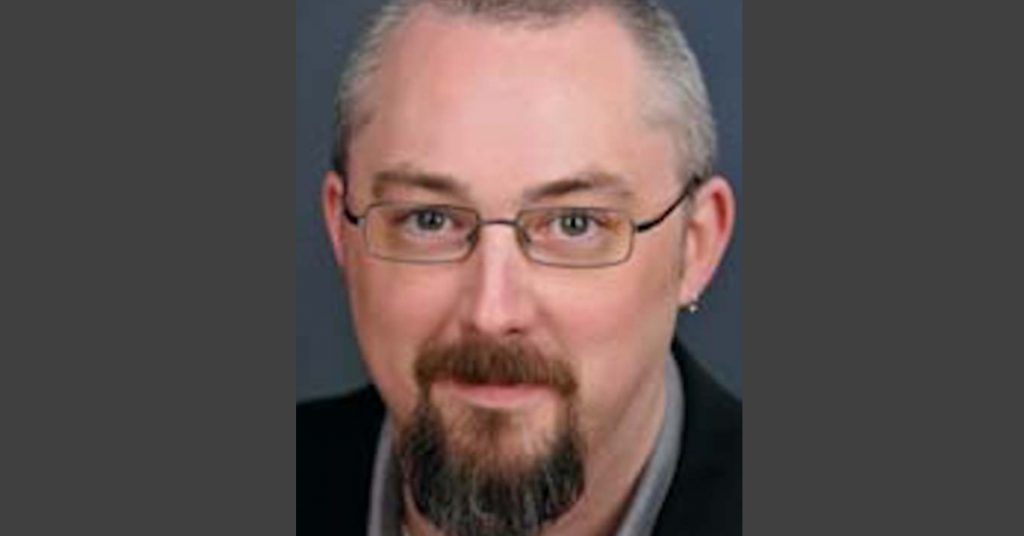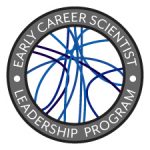Stuart Macdonald is the Director of the K-INBRE Bioinformatics Core Facility, as well as a Professor in the Department of Molecular Biosciences at the University of Kansas. He points out the importance of mentoring in his career journey, from the UK to the US, and he discusses how he balances different aspects of his job.
In the Decoding Life series, we talk to geneticists with diverse career paths, tracing the many directions possible after research training. This series is brought to you by the GSA Early Career Scientist Career Development Subcommittee.
 As a high school student, Stuart discovered his love of biology and knew that he would continue to study the subject in college. In high school, he was interested in animal behavior and ecology. Then, when he was an undergraduate at the University of Oxford, he became really excited by genetics and more quantitative and mechanistic aspects of biology. After his postdoc at the University of California, Irvine, he decided to pursue his career in the United States and joined the University of Kansas, where he currently serves as the director of the K-INBRE Bioinformatics Core alongside his faculty position. His enthusiasm for mentoring led to him becoming the director of Graduate Studies for the Department of Molecular Biosciences.
As a high school student, Stuart discovered his love of biology and knew that he would continue to study the subject in college. In high school, he was interested in animal behavior and ecology. Then, when he was an undergraduate at the University of Oxford, he became really excited by genetics and more quantitative and mechanistic aspects of biology. After his postdoc at the University of California, Irvine, he decided to pursue his career in the United States and joined the University of Kansas, where he currently serves as the director of the K-INBRE Bioinformatics Core alongside his faculty position. His enthusiasm for mentoring led to him becoming the director of Graduate Studies for the Department of Molecular Biosciences.
What is your role as the Director of the K-INBRE Core?
IDeA Networks of Biomedical Research Excellence (INBRE) is a type of NIH infrastructure grant for states that historically have received low levels of NIH funding. The vast majority of the funds that come through the organization ultimately go to supporting undergraduate, graduate, and postdoctoral research. All of the INBRE programs have a focus on bioinformatics.
My role in the Kansas INBRE is to support training in informatics, both at the undergraduate and faculty level. For example, in the last few years, we’ve been able to do things with RNA sequencing that can really inform research, but you may have never thought about how you would deal with data like that or the infrastructure to carry out the analysis. We provide those kinds of things. We have lots of nodes in our cluster, and we have a mentor—a doctoral-level bioinformatics specialist—who works directly with faculty and students to help analyze the data or train them to analyze their own data. Also, we’ve started to do undergraduate training work.
Can you also talk a little bit about your role as a Director of Graduate Studies for the Department of Molecular Biosciences?
Being the Director of Graduate Studies actually involves a little less hands-on training than I might prefer. I mostly get involved quite heavily in the admissions process, to make sure that the graduate program runs relatively smoothly. I am also the point person for the students who are having difficulties with, really, anything. Especially when important decisions are about to be made, such as before the end of the last rotation, I get lots of people talking to me, asking for advice about which lab to pick. I can give independent advice on what they might really enjoy. It’s a fun job, but it is more of an administrative role than a mentoring role.
What are the most inspirational or challenging aspects of your work?
First of all, it always stays interesting. There’s always something new to be thinking about! The best thing is that I get to work with lots of different people with lots of different questions about their professional development and science.
However, working in different environments is also challenging because now I have a thousand balls in the air. It does help to be pretty organized, which I think I am. I have also gained some experience over time. Fortunately, it takes me less time to review a paper than it did a few years ago. Since I’ve been Director of Graduate Studies for five years, I now understand enough about the institutional system that when I don’t know how to solve a student’s problem, I know exactly who to call. The worst thing is that once you know where your own limits are, you then have to say no to anything outside of that. However, that becomes very challenging to do because often those things you’re saying no to are things that you might either really enjoy or you think could be important. Briefly, it’s fun for the same reason it’s problematic.
You did your PhD in the UK but pursued your career in the US. Can you tell us about your transition process?
My experience was probably smoother than lots of people, since I speak English natively. In terms of a lab culture, the way research works is quite similar in the UK and the US. So, it was a pretty easy transition to make. I struggled with the same visa regimes that everybody does. Before I moved to the University of Kansas and eventually got a green card, I was on an H1B visa for a few years and a J1 before that. The problem is that the J1 visa only runs for a year, so you have to go back to your home country, spend several hours in the US Embassy and hope that you will get your passport soon. There was a time when I was due to fly back, and my passport arrived the morning of my flight. That was really scary. But those were really the only roadblocks. My transition was relatively straightforward—common language, similar culture to some degree. I think I had an easy ride, in all honesty.
How has mentorship influenced your career, and what advice do you have for trainees on seeking out mentorship?
Mentoring has been really important for me over the years. My PhD was only three years in the UK. Hence, my experience level in comparison with a US person with a PhD was probably a little lower. But, my postdoc advisor was incredibly helpful from a practical and intellectual perspective. Toward the end, he started to really include me in the discussions about how grants get reviewed, how departments run, and how to think administratively about a faculty position.Those discussions were really helpful, particularly since I had no exposure to US granting agencies, because I couldn’t apply to anything as an international scientist. All that stuff was really valuable when it came to writing my first grant.
In terms of seeking out mentorship, firstly your PI is the person that you’ll go talk to for a lot of things. When you’re a graduate student, particularly in the US, the committee gives you this other set of people who are a little independent from your mentor. I think that’s a really valuable system because no one is going to have the perfect mentoring strategy. However, you should not just fill your committee with people who do the same sciences as you do; make sure there are people on that committee who you can actually talk to about things besides your specific science. There isn’t really a similar committee of people who work with you when you are a postdoc, so being comfortable seeking out mentoring is also important.
Asking somebody for help is incredibly challenging because you don’t want them to see you as not being able to do your job, particularly in the first week after they’ve hired you. However, your colleagues want you to be successful because they have just hired you and they will want to help you out. Also everybody recognizes that when you start your faculty position or your postdoc, there’s lots of new stuff you’re going to have to do that you didn’t do in your previous job. When I first started my faculty position, I just found people who seemed to have incredibly functional labs and asked them about their secrets. I figured it would be really helpful if I got some advice, so that I could avoid making mistakes for the next year!
About the author:
 Seyma Katrinli is a member of the Early Career Scientist Career Development Subcommittee and a Postdoc at the Emory University School of Medicine.
Seyma Katrinli is a member of the Early Career Scientist Career Development Subcommittee and a Postdoc at the Emory University School of Medicine.
Learn more about the GSA’s Early Career Scientist Leadership Program.
































